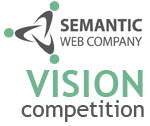Learn more
- May 20, 2008
And the winner is: The vision of a future where ordinary people publish structured data

Aman Shakya, who is a PhD student at the Department of Informatics at The Graduate University for Advanced Studies (SOKENDAI) in Tokyo, developed his vision around the idea of ordinary people being able to publish structured data instead of unstructured text:
The current gigantic network of web documents could be realized by enabling any user to publish any document and link to other documents. If we want to see the network of Linked Open Data explode on a similar scale, we need to enable general users to publish “data†directly on the web and link to other “dataâ€. We need to move the paradigm of web page publishing and hyperlinking towards data publishing and data linking. We should enable people to post structured data about anything rather than just unstructured text. We need the active participation and contribution of the billions of worldwide internet users. Recently, the web has seen enormous user participation with the rise of easy-to-use social software. We should exploit this trend of social web applications, however, for enabling people to create, share and link “data†on the global Linked Data Web.
To endorse his vision, Aman Shakya also introduced his StYLiD application, which I would like to describe as a ‘semantically enhanced tumblelog’, and which “enables people to share a wide variety of structured data with the freedom to define their own structured concepts on the fly.” We have chosen his proposal because it met the criteria of the competition in various ways:
- The feasibility of the vision is clearly laid out in the proposal, which describes the process of the creation of structured data and the interaction with existing data on the web.
- The proposal has innovative potential in that it seeks to further and harness the collaborative sharing of structured data, and combines bottom-up and top-down governance for the social semantic web.
- Sustainability is achieved by its reliance on open standards such as SPARQL.
Read his full proposal here.
We would also like to make an honorary mention of Mike Veytsel’s quadruple-fold approach to a semantic future in which users will be able “to easily and finely tune in to the long tail of knowledge and find content with low friction and high precision.”
Finally, I would also like to give my personal bookworm award to Rob Styles, for his prose account of a life with the semweb which he develops as an antithesis to Orwellian dystopia.
A big ‘Thank you’ to everyone who contributed!
